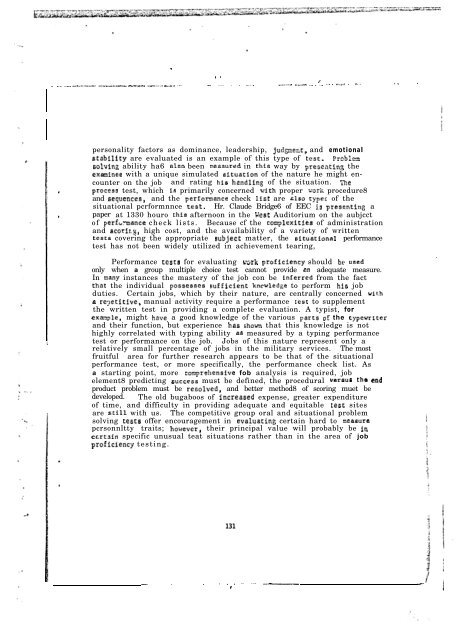Technical Report - International Military Testing Association
Technical Report - International Military Testing Association
Technical Report - International Military Testing Association
You also want an ePaper? Increase the reach of your titles
YUMPU automatically turns print PDFs into web optimized ePapers that Google loves.
. . _-. .._. -...a_-e,-,. .-Y.-e--.. .-V.-d_ -..w-.... -..-- ._-. - .I. . . --.<br />
I<br />
. .<br />
131<br />
/<br />
.___,__ .__- -. . .._ -... . -.-.+ - .._, .I .<br />
personality factors as dominance, leadership, judgment, and emotional<br />
6tnbflity are evaluated is an example of this type of te8t. Probira<br />
eolving ability ha6 nlso been mesaured in thfa way by prerznting the<br />
examinee with a unique simulated s:tuation of the nature he might encounter<br />
on the job and rating hie hendling of the situation. Tne<br />
process test, which ia primarily concerned with proper vork procedure8<br />
and sequencea, and the perfonaanct? check lilt are also typec of the<br />
situational pcrformnnce te6t. Hr. Claude Bridge6 of EEC 5.3 presenting a<br />
paper at 1330 houro thie afternoon in the Vest Auditorium on the aubjcct<br />
of perfbmance check lists. Because cf the complcxitiee of administration<br />
and acoritg, high cost, and the availability of a variety of written<br />
tests covering the appropriate eubject matter, the eituational performance<br />
test has not been widely utilized in achievement tearing,<br />
Performance tests for evaluating murk proficfency should be uded<br />
only when a group multiple choice test cannot provide en adequate measure.<br />
In nany instances the mastery of the job con be inferred from the fact<br />
thnt the individual possesees eufficient kncwledge to perform hlc job<br />
duties. Certain jobs, which by their nature, are centrally concerned wit-h<br />
a re;)ctitive, manual activity require a performance teet to supplement<br />
the written test in providing a complete evaluation. A typist, for<br />
exzrple, might have. a good knowledge of the various parts of the typewrfter<br />
and their function, but experience haa shown that this knowledge is not<br />
highly correlated with typing ability a8 measured by a typing performance<br />
test or performance on the job. Jobs of this nature represent only a<br />
relatively small percentage of jobs in the military services. The most<br />
fruitful area for further research appears to be that of the situational<br />
performance test, or more specifically, the performance check list. As<br />
a starting point, more comprehenefve fob analysis is required, job<br />
element8 predicting GucceGG must be defined, the procedural verauo the end<br />
product problem must be rccolved, and better method8 of scoring muet be<br />
developed. The old bugaboos of increnPed expense, greater expenditure<br />
of time, and difficulty in providing adequate and equitable tett sites<br />
are still with us. The competitive group oral and situational problem<br />
solving test6 offer encouragement in evalusting certain hard to meatiute<br />
pcrsonnltty traits; however, their principal value will probably be in<br />
ccrt8in specific unusual teat situations rather than in the area of job<br />
proficiency testing.<br />
__ . - . . . .- --- --- /-<br />
,<br />
.









